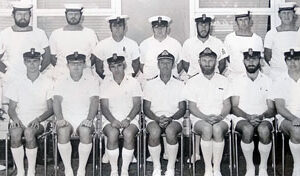Mostly the student experience focuses on the inaugural years of MLTC. However, the Education Department lost jurisdiction over Mt Lawley in 1974, and the college was rebranded as Mt Lawley College of Advanced Education, which eventuated in Edith Cowan University in 1991. These are the stories of those who attended in the changing times after MLTC disappeared.
Peter Blake 1974-76:

After the Vietnam War the Military was having difficulty recruiting, especially professionals (doctors, lawyers, dentists and teachers). Apparently, Navy Office thought it would be a good idea to train sailors they already had and so a new branch was created – “Academic Instructor’ as distinct from “Instructor Officer”.
Originally conducted at Frankston Teachers College in Victoria for the 2yr Trained Primary Teachers Certificate the scheme relocated to Mount Lawley Teachers College for the 3yr Diploma of Teaching in 1971.
The MLTC co-ordinator and mentor at the time was Dick Lamb, who was himself an ex-sailor. It was anticipated AI’s would teach Junior Recruits at HMAS Leeuwin in Fremantle. Most of us were Vietnam Veterans and of various seniority which provided an example to the young men at Leeuwin.
The first intake of AI’s was in 1972 and then the program continued until 1979 with four sailors each intake. Entry to the scheme required four Yr 12 subjects (which I undertook via night school 1972-73 in Frankston whilst posted to HMAS Cerberus) for those who hadn’t achieved Yr 12 on initial recruitment into the Navy. AI’s attended MLTC full time but on campus holidays taught at Leeuwin. As Leading Seamen and Petty Officers (depending on rank at transfer) we were employed for usual Naval duties (the attached shows me as a senior Petty Officer as part of a Royal Guard of Junior Recruits on parade at Perth Airport to farewell the Governor General, Sir John Kerr, on route to his new appointment in Paris).
As time passed and our numbers increased AI’s were posted to other training establishments around Australia – I was posted to the Royal Australian Navy School of Training Technology (RANSTT) as an instructor on the Instructor Training Course. Some AI’s completed their BEd. and went on to become Instructor Officers and extended their careers in the Navy. Others “paid off” to pursue teaching or other careers in civilian life. After discharge I combined my trade background (I originally joined as an apprentice) and teaching qualification to eventually become HOD of Manual Arts at Guildford Grammar School.
Whilst at MLTC we participated in many facets of College life (I played volleyball under Phys Ed. lecturer Rod Ellis at Inter Collegiate Games and with the WA Volleyball Assoc. We were not the run-of-the- mill mature age students with our short hair and I am not aware of any of us who regretted our MLTC experience. Many of us were of similar age to many of the lecturers but out of respect I always called them Mr, Mrs or Miss. I hope this gives some insight into what was an interesting albeit short lived scheme that offered those so inclined an opportunity to gain a valuable qualification and life experience – I wouldn’t have missed it for quids!
Norman Hammond:
Commencement in teaching in 1980, the year of my Graduation, was incredibly satisfying with an excellent class of 35 children. Upon completing that year and transferring to Kojonup District High School as Agricultural Teacher (secondary), 10 of my Year 5 former students visited for a weekend. This set the stage for close links with students and ex-students for the next 37 years.
Moving into primary teacher also at Kojonup (due to permanancy needs), I had Year 3 in the morning and Years 9-10 Agricultural Studies in the afternoon. Transferring after 3 years, to Karratha SHS as the Youth Education Officer, this was the most enlightening time thus far, with a radio program,intense team events and many informal events for the next 3 years. Karratha changed my life’s extra-curricular direction. Then, the next transfer was Lesmurdie SHS as Youth Education Officer, followed by Primary teaching at Falls Road Primary School in Lesmurdie. My last transfer was to Kelmscott SHS as the Primary Agricultural Awareness Coordinator with over 3000 visiting children to our school farm annually,for 25 years.
This role enabled flexibility in my activities, with 3 Canadian conferences, 4 eastern-state conferences, 2 snowfield excursion, a temporary management position both at Point Peron Camp School and Merredin Residential College.
I was able to have time-out, driving for the 2000 Olympic Torch Relay (100 days),the 2006 Melbourne Queens Baton (50 days) and the 2018 Gold Coast Queens Baton Relay (70 days)- in 2000, I had the honor of being a torch-bearer, as also was the case in 2018 with the Queens Baton, in recognition for continued community service. (This service included a gardening service for 8 years, a Red Cross Soup van stint monthly for 9 years, and a food pickup weekly (from Bakers Delight) for 8 years).
Highlights within the 38 years were the 30+ leadership camps, many gruelling team events in the Pilbara (Black Rock Stakes: 17 teams over 25 years,most involving 5 days away and bus-travel of 4000 kms), Kalgoorlie and South-west areas, as well as long-distance Drug-Free Lifestyle Runs (coordinating these 670/553/398 km runs).
I have found much satisfaction, in linking many of these events with students and ex-students, seeing the lasting rapport and the maturing development of these individuals. Certainly, my teaching roles were paramount, and I am very appreciative of the start of this adventure, upon graduating from Mount Lawley College of Advanced Education.